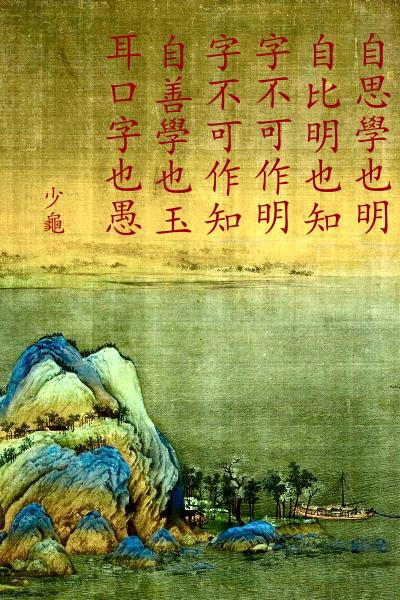
(PD) Wang Ximeng's A Thousand Li of Rivers and Mountains (Cropping, text, and modifications by Larry Neal Gowdy)
Copyright ©2023 March 27, 2023
好 Is Good, But It Does Not Mean Good
When someone says something is 'good', a smart thing to do is to ask oneself why the thing is good. Dictionaries are unable to adequately describe why 'good' is 'good'. The only useful descriptions must arrive from oneself.
The word good is reported to have evolved from the Old English word god, which meant similarly as it is interpreted today: 'god, deity'. A religion's god might be good, but all things good are not gods.
好 (hao) is a common word throughout the ancient Chinese texts, and most commonly it is translated into English as good. 好 is composed of 女 (female) and 子 (child).
Ask oneself: why is a female and a child good? Why is a female child good? What is good about it? If 惡 infers a manner of 'inferior heart', and if 愚 infers 'monkey-brains stupid', then what does 好 mean?
While watching a historical Chinese drama, the closed captioning showed both the Chinese words and the given English translations. A male character spoke the word "hao", and the closed captioning showed 好 as well as "good". The character's use of "hao" was articulated to infer that he was pleased to hear of a scenario that was agreeable to his sense of a desired outcome. Within the drama's scenario, acting, vocal tones, and script, the impression was strong that the character did indeed imply "good".
Modern English is not Old English, and modern Chinese is not ancient Chinese. In the ancient Chinese texts, 好 is used within sentence structures that do not imply 'good'.
The modern European patterns of thinking are not identical, the same, nor equal to the ancient Chinese patterns of thinking. If an individual does not possess 思 (si), then the individual will not be able to grasp the meaning of 好.
My own early attempts to define 好 were lackluster. Sure, it is easy to recognize a very vague and general concept of 好 that is hugely superior than Legge's and Dubs', but the descriptive details remained elusive. Then one night while thinking of parallel sentences within several different books, an interesting idea popped into mind. If the idea were valid, then the description of 好 ought to coherently fit within most all pre-200 B.C. Chinese texts. After changing the definition of hao within numerous sentences of different books, and finding the improved definition to not only coherently fit, but to also enable a clarification of the sentences and the surrounding sentences, my excitement was emotionally large throughout the evening.
But then the emotional high fell as questions arose: why did the Christian missionaries and Oxford University employees James Legge and Homer Dubs not know the definition? Did Legge and Dubs purposefully alter the definition out of envy and hate? Why did none of Legge's and Dubs' Chinese helpers explain the definition? Did the modern Chinese helpers also not know? Why is the definition never spoken of in any known source? And much more disturbing was the realization that the concept of 好 never existed within Europe throughout history, and does not exist within any known nation today.
The cause is not that people have changed much over the past 2,500 years; people are pretty much the same kind of people they always have been. Within English literature and dictionaries, the concept of 好 does not exist. 好 hints at one of the most beautiful things ever known to man, and yet it appears to not exist within any culture, which is not merely sad for the people, it is also depressing that cultures no longer so much as have an idea that 好 is possible.
The moral of the story is that regardless of whether or not someone might speak the same language that was spoken thousands of years ago, it does not mandate that the same words' meanings have remained the same.
A very rough draft translation from Zhong Yong #11: 'Zi say: Natural hidden behavior, strange future generation, have express how I not do it (-carry). Junzi honor way, and behavior half Tu(rivers) and terminate. I not able stop (-carry). Junzi rely-on similar, center use hidden, generation not meet know, and not regret only sage person-ist able it.'
And so goes the generations of today; the generations do not know of the old ways, and within the unknowing, the modern generations do not regret the loss of 好, nor do the generations so much as care to ask what it was.
(Note: as has been the practice since this site was first created, the given translations will continue to give common English dictionary words for 好 and other ancient Chinese words.)